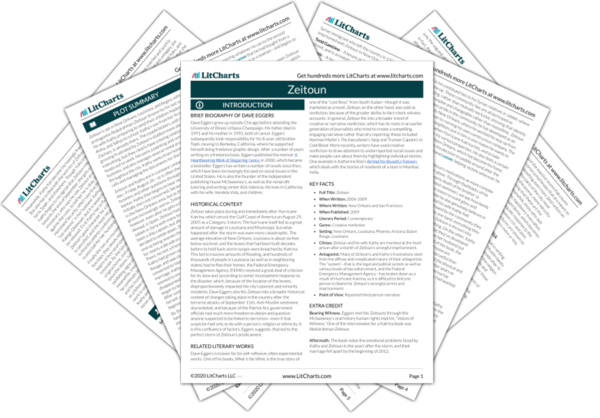Abdulrahman Zeitoun, the protagonist of Zeitoun, has found community in a number of places: in his family, in New Orleans, in the Muslim community, and in his continued ties to his Syrian relatives in Jableh, where he grew up. These community ties are all portrayed as coexisting, rather than mutually exclusive, showing that identity can be complex and changeable rather than monolithic. Zeitoun clearly takes pride in the community he has developed as an immigrant to New Orleans, where he worked his way up from being a seaman to running his own construction company. The trust that his neighbors put in him is one reason he wants to stay in the city when Hurricane Katrina hits, and to take responsibility for his various properties. He also feels a certain responsibility for New Orleans, which has become his home. This then influences his decision to paddle around after the storm in his second-hand canoe, helping victims wherever he finds them.
The book also shows Zeitoun’s motivations as more complex than those of a do-gooder alone. Through flashbacks of his childhood in Syria and the early death of his brother (a nationally ranked and acclaimed swimmer), we see how family and community give Zeitoun a reason to want glory and validation for himself—even while he also genuinely believes in what he is doing. Both Zeitoun and his wife Kathy feel alternately hopeful about and betrayed by the community they have created for themselves. On the one hand, everything they have done seems not to matter once Zeitoun is thrown into prison without being charged for anything. On the other, Kathy is able to use the numerous contacts that they’ve developed through their years in New Orleans to get her husband out months earlier than his friends. By the end of the book, the couple’s belief in the ties of community and home are shaken—they are far more vulnerable and mistrustful than before the storm—but they continue to rebuild the physical and emotional bonds that they had developed in earlier years as they attempt to recreate this community. Still, Katrina has undeniably challenged the sense of home that they had worked hard to construct.
Family, Community, and Home ThemeTracker

Family, Community, and Home Quotes in Zeitoun
The banter they’d developed, full of his exasperation and her one-liners, was entertaining to everyone who overheard it. It was unavoidable, too, given how often they talked. Neither of them could operate their home, their company, their lives or days without the other.

Unlock explanations and citation info for this and every other Zeitoun quote.
Plus so much more...
Get LitCharts A+Mohammed’s accomplishments implied—proved, really—that the Zeitouns were extraordinary. It was incumbent, thereafter, on each and every child to live up to that legacy.
But Zeitoun felt again that perhaps this was his calling, that God had waited to put him here and now to test him in this way. And so he hoped, as silly as it seemed, that his siblings might see him like this, on the water, a sailor again, being useful, serving God.
She had married a bullheaded man, a sometimes ridiculously stubborn man. He could be exasperating in his sense of destiny. […] But then again, she thought, it gave their marriage a certain epic scope.
He had long believed that the police acted in the best interests of the citizens they served. That the military was accountable, reasonable, and was kept in check by concentric circles of regulations, laws, common sense, common decency. But now those hopes could be put to rest.
He had risked too much in the hopes that he might do something to match the deeds of his brother Mohammed. No, it had never been a conscious part of his motivation—he had done what he could in the drowned city because he was there, it needed to be done, and he could do it. But somewhere in his gut, was there not some hope that he, too, could bring pride to the family, as Mohammed had so many years ago? […] And was this imprisonment God’s way of curbing his pride, tempering his vainglorious dreams?
Kathy fell apart. She wailed and screamed. Somehow this, knowing that her husband was so close but that these layers of bureaucracy and incompetence were keeping her from him—it was too much. She cried out of frustration and rage. She felt like she was watching a baby drown, unable to do anything to save it.
They held each other for a long moment. She could feel his shoulder blades, his ribs. His neck seemed so thin and fragile, his arms skeletal. She pulled back, and his eyes were the same—green, long-lashed, touched with honey—but they were tired, defeated. She had never seen this in him. He had been broken.
The Zeitouns have lived in seven apartments and houses since the storm. Their Dublin Street office was leveled and is now a parking lot. The house on Dart is still unfinished. They are tired.
As he drives through the city during the day and dreams of it at night, his mind vaults into glorious reveries—he envisions this city and this country not just as it was, but better, far better. It can be.











